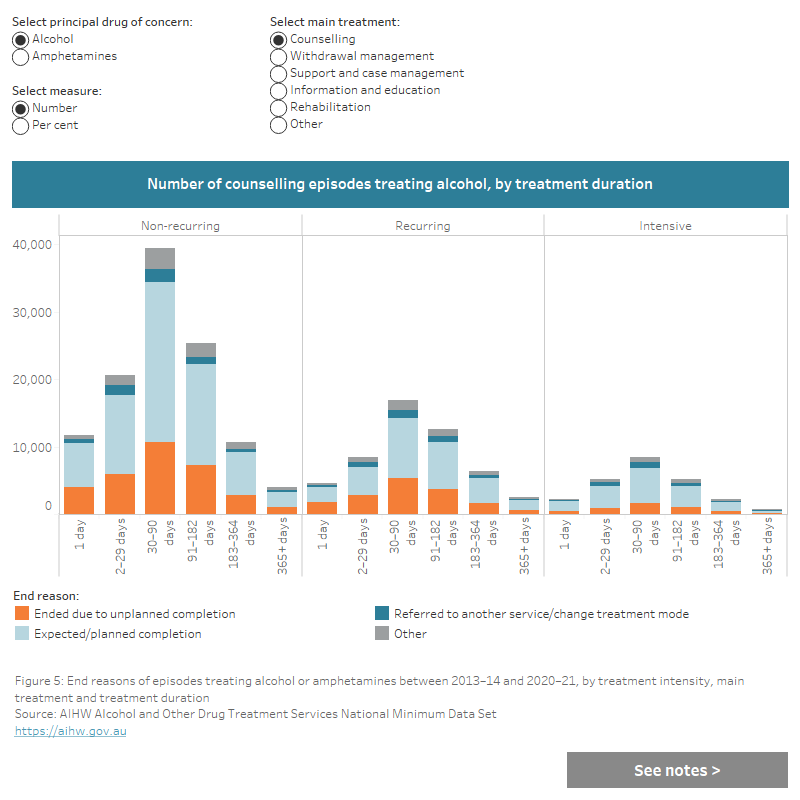Treatment type and duration
Clients receiving intensive treatment for alcohol and amphetamines had a shorter median duration of treatment episodes than recurring and non-recurring clients, as shown in Table 3. Across most treatment types (with the exception of withdrawal management and other treatment types), clients receiving intensive treatment had the shortest median duration of episodes, while clients receiving recurring treatment had the longest.
Figure 5 presents reasons for cessation by duration interval and treatment type.
|
Principal drug of concern |
Intensive |
Recurring |
Non-recurring |
|---|---|---|---|
|
Alcohol |
22 |
43 |
40 |
|
Amphetamines |
31 |
48 |
42 |
Figure 5: End reasons of episodes treating alcohol and amphetamines between 2013–14 and 2020–21, by treatment intensity cohort, main treatment and treatment duration
This interactive data visualisation shows the number and proportion of episodes provided to clients receiving intensive, recurring and non-recurring treatment for alcohol or amphetamines. Episodes are presented by reason for cessation, main treatment type and treatment duration.

Counselling
Counselling episodes for both alcohol and amphetamines most commonly lasted 30–90 days. Treatment episodes that lasted 1 day had the highest proportion of unplanned completion across all treatment cohorts for both alcohol and amphetamines (19–38% for alcohol; 27–47% for amphetamines) with the proportion of planned completion increasing with treatment duration.
Rehabilitation
Rehabilitation episodes for alcohol and amphetamines most commonly lasted 30–90 days. Treatment episodes that lasted 2–29 days had the highest proportion of unplanned completion across all 3 treatment cohorts:
- more than 5 in 10 (52–56%) of episodes provided for alcohol
- around 6 in 10 (55–64%) of episodes provided for amphetamines.
Across all treatment cohorts, rehabilitation episodes that ended with a planned completion had a higher median duration than episodes that ended for all other reasons (unplanned, referred to other service and other).
The median duration of rehabilitation episodes treating alcohol that ended with a planned completion was:
- intensive: 59 days, compared to 38–44 days for episodes that ended for all other reasons
- recurring: 82 days, compared to 41–54 days
- non-recurring: 82 days, compared to 37–48 days.
The median duration of rehabilitation episodes treating amphetamines that ended with a planned completion was:
- intensive: 50 days, compared to 30–36 days for episodes that ended for all other reasons
- recurring: 76 days, compared to 34–44 days
- non-recurring: 70 days, compared to 32–41 days.
Information and education
The majority of information and education episodes provided to all treatment cohorts lasted 1 day. Of treatment episodes that lasted 1 day, the majority ended with a planned completion:
- 87–97% episodes provided for alcohol
- 93–96% episodes provided for amphetamines.
Treatment episodes that lasted longer had a higher proportion of unplanned completion.
For further detail, refer to Supplementary tables BLTN.6 to BLTN.9.


